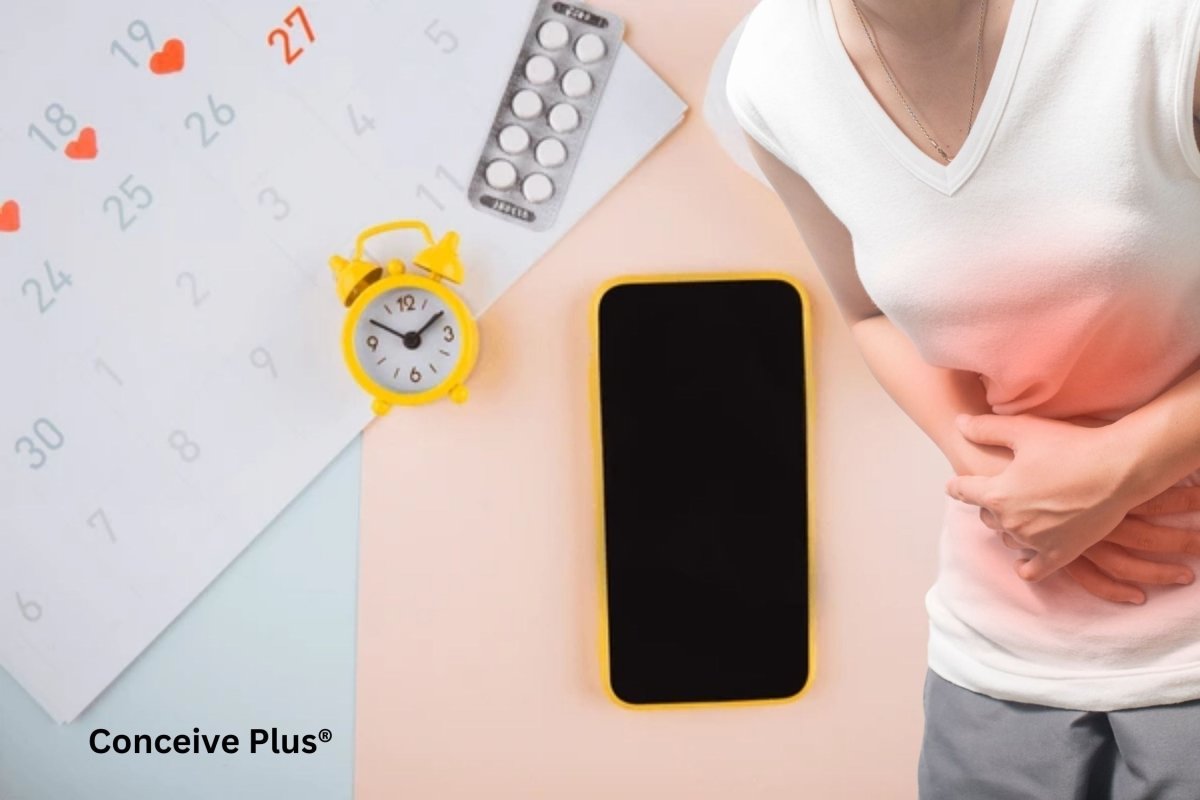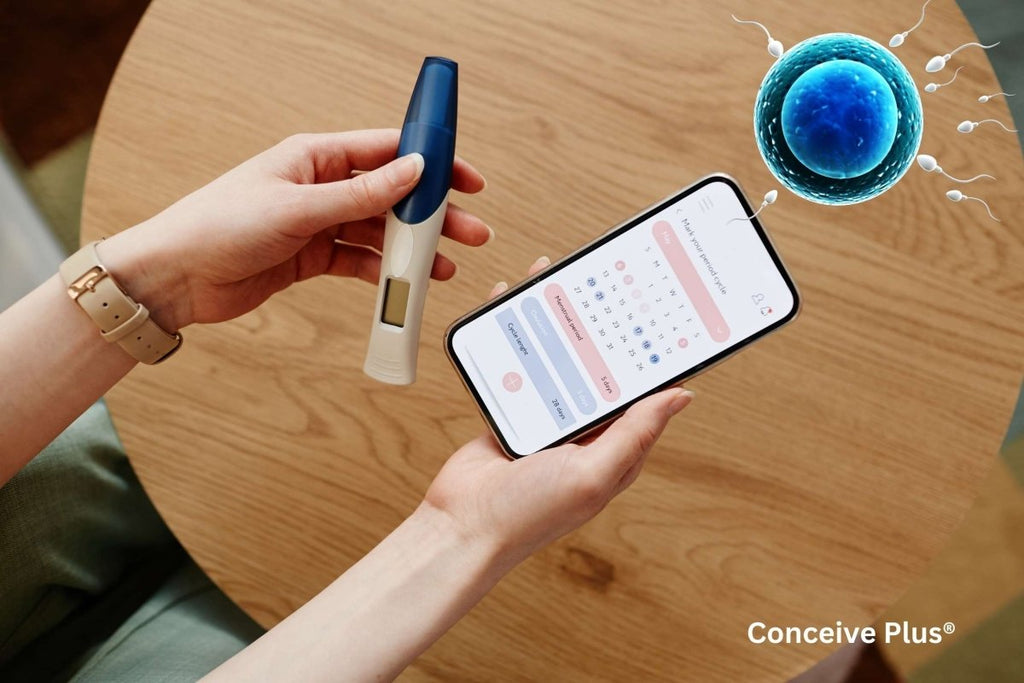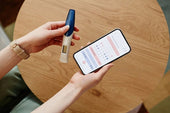How Can I Know When Is My Next Period?

The menstrual cycle is an essential part of a woman's overall health and well-being. Whether a woman is trying to conceive or just wants to understand her body better, knowing when her next period will come can be significantly helpful.
The length and pattern of the menstrual cycle can vary from person to person. However, it usually stays consistent for an individual unless something affects their reproductive health, such as stress, illness, or hormonal changes [1].
The most common menstrual issue many women face during their reproductive years is delayed periods. Such delays can occur for a variety of reasons and raise questions like, when is my next period, or when is my next menses?
Basics of Female Menstrual Cycle
To understand the causes of period delays and predict the next period date, it's important to first understand the basics of the menstrual cycle. The female menstrual cycle or reproductive cycle is a monthly process that involves four phases [2]. Typically, a cycle lasts about 28 days, although it may vary for each person.
The cycle includes the follicular phase, ovulation, and the luteal phase, followed by menstruation. A clear understanding of these phases can help answer questions like when is my next menstruation and when will my next period be.
Each phase has a different role, but they all work to prepare the body for potential pregnancy. Their roles include:
- Follicular Phase: During the follicular phase, the body releases follicular stimulating hormone (FSH) that matures the egg cells in the ovaries [2]. This phase also involves the thickening of the uterine lining, which makes it favorable for the implant of a fertilized egg.
- Ovulation: After the follicular phase ends, the body releases luteinizing hormone (LH), which signals the egg release. This phase is called ovulation, and it is the most fertile duration for a woman during her monthly cycle [3]. The egg then travels to the fallopian tube, where fertilization occurs in the presence of a sperm cell.
- Luteal Phase: After ovulation, the body assumes that pregnancy will occur, so it starts preparing for the potential pregnancy during the luteal phase. This involves thickening and nourishing the uterine lining [2]. If pregnancy doesn't occur, the cycle ends with the start of menstruation or periods.
- Menstruation: Menstruation marks the start of the new cycle, and it is when the thickened uterine lining starts to shed. It is the most painful and discomforting time of the monthly cycle and a woman experiences menstrual bleeding and cramps [4].
Knowing these phases can help answer some common questions, such as how to know when my next period will come or how do I track my period.
Why Tracking Your Cycle Is Important?
Tracking your menstrual cycle is helpful in several ways. When you track your period, you can notice patterns and changes over time, which might help you recognize when something might be off. This information is not only useful for planning conception but also for detecting any problem with reproductive health.
You might ask, how does my period tracker can help plan conception?
Well, it’s a valid question, but it is often misunderstood by many women. A woman is most fertile around her ovulation days, making conception more likely when planned intercourse during this time [3]. So, if you keep track of your cycle and identify your most fertile days, you can increase your chances of getting pregnant.
Many people now use digital tools and mobile applications as a menstrual calendar or menstrual cycle tracker to simplify the process. With the rise of technology, you can now use a menstrual tracker app to log symptoms, moods, and cycle dates, making it easier for anyone who wonders how to calculate next period date.
Methods to Track Your Menstrual Cycle
Most females worry about tracking their period during their early cycles and often ask, how do I track my period, or whens my next period? There are several options that can help you track your menstrual cycle and answer questions about when is my period due.
You can choose a manual method, such as a written journal or a printed calendar, or you can use digital methods like apps and online tools. Here is a brief explanation of the use of different methods:
Traditional Calendar or Journal
This method involves marking the start and end dates of your cycle on a physical calendar or in a journal. When you look back at the calendar after several cycles, it helps you visually see patterns over several months.
You can note the length of your cycle, any symptoms you experience, and other related observations. With that information, you can precisely predict your next period date or other important events of the cycle, like ovulation.
Digital Tracking Tools
With digital tools, you can easily update your records on your smartphone. You can find many such tools on the internet by just searching keywords like best free period tracker, best period tracker app free, menstrual period tracker, or period tracker app.
Using a free period tracker or free period tracking apps can be especially useful for those who want to maintain a record without financial investment. These digital tools provide a user-friendly interface that simplifies the entire process of keeping a record of previous cycles and predicting the events of the coming cycles.
Calculating Your Next Period Date
When surfing the internet or consulting a professional, women usually look for the answer to a common question: How to calculate next period date? While the typical cycle is 28 days, variations occur due to stress, illness, and lifestyle changes [1].
If your cycle is regular, you can use an online period tracker to predict your next period. This can be done simply by entering the start date of your last period along with your average cycle length.
For instance, if your cycle is consistently 28 days, and you know the first day of your last period, you can simply add 28 days to get an estimate of your next period. However, if your cycle is irregular, a menstrual calendar or menstrual cycle tracker that collects data over several months can provide more accurate predictions.
What Can Lead to Late Periods?
There are several reasons why you might get delayed periods. One common assumption regarding delayed or missed periods is pregnancy. However, pregnancy is usually not the cause behind delayed periods if you are not trying to conceive.
Here are some factors which lead to delayed periods in most cases:
-
Poor Diet
A poor diet can significantly affect menstrual regularity, often leading to period delays [5]. Nutrient deficiencies, especially in iron, vitamins, and essential fats, can disrupt hormonal balance, affecting ovulation and cycle timing. Sudden weight loss or gain from unhealthy eating habits can also interfere with cycle tracking.
-
Lifestyle Factors
Changes in weight, exercise habits, or even travel can affect your cycle. For example, starting a new exercise routine or experiencing significant weight changes might lead to delays.
If you’re curious about how to track my cycle or track my period trends related to lifestyle changes, keeping a record of these habits and their impact can help.
-
Stress and Anxiety
A balance of different hormones regulates the pattern of your menstrual cycle. Stress can disrupt this hormonal balance, causing delays in ovulation and menstruation. If you are experiencing chronic stress, tools like a period calendar period tracker can help you notice these irregular patterns and delays in your cycle.
-
Medical Conditions
Fluctuations in hormones are often due to medical conditions. For example, polycystic ovary syndrome (PCOS) leads to hormonal imbalances, which may cause irregular cycles or delayed periods [6].
Keeping track of your cycle with a menstrual tracker app can help you spot patterns and notice if something feels off. It makes it easier to catch potential reproductive health issues early and manage them better.
When Late Periods Are Due to Pregnancy?
If you’re trying to conceive and notice a missed or delayed period, pregnancy could be the reason. In such a case, you should look for other reliable signs of pregnancy, which include:
- Nausea or morning sickness
- Tender or swollen breasts
- Fatigue and increased tiredness
- Frequent urination
- Mild cramping or implantation bleeding
If you notice these symptoms along with a delayed period, it’s a good idea to take a home pregnancy test for confirmation. If you get a positive test result, book an appointment with the doctor to confirm the pregnancy and discuss prenatal care. If the test result is negative but pregnancy symptoms persist, try testing again after a few days.
Addressing Concerns About Irregular Cycles
It is important to understand that not everyone has a 28-day cycle. If your cycle length is, let’s say, 32 days and it is consistent, then your cycle is normal, and you are not experiencing delays or having irregular periods. However, if the cycle length is not consistent, you should look for possible reasons, including stress, hormonal imbalances, or certain medical conditions.
Using a period tracker free option helps you collect detailed information about your cycle. Over time, you may notice patterns that can be discussed with your doctor. By combining personal tracking with professional advice, you can better understand any underlying causes and receive appropriate care.
If you're keen to enhance your cycle monitoring skills, explore our comprehensive guide on how to track period for a deeper look into your menstrual patterns.
The Bottom Line
For any woman, understanding her menstrual cycle is essential for managing her health. Period delays are common during the reproductive years, often leading to the question: when is my next period?
Tracking your cycle helps determine the cause of delayed periods and predict your next period accurately. The calendar method and online period tracker apps are popular tools for monitoring cycles and detecting irregularities.
Irregular periods can sometimes be a sign of underlying health issues like PCOS. It’s important to monitor any unusual changes or symptoms and discuss them with a doctor to prevent potential complications.
FAQs
-
How do I know when my next period will come?
If you are worried when is my next period due, track your cycle using a menstrual calendar or a next period tracker app. These tools help you record past periods and predict your next one based on your average cycle length.
-
How can I find most accurate period tracker online?
To find the most accurate period tracker online, check user reviews to see how well it predicts cycles for others. You can also try a period tracker online free for a few months to see if it correctly tracks your cycle and period patterns.
Resources Used
- What causes menstrual irregularities? (2017b, January 31). https://www.nichd.nih.gov/. https://www.nichd.nih.gov/health/topics/menstruation/conditioninfo/causes
- Thiyagarajan, D. K., Basit, H., & Jeanmonod, R. (2024d, September 27). Physiology, menstrual cycle. StatPearls - NCBI Bookshelf. https://www.ncbi.nlm.nih.gov/books/NBK500020/
- Pregnancy - identifying fertile days: MedlinePlus Medical Encyclopedia. (n.d.-d). https://medlineplus.gov/ency/article/007015.htm
- National Library of Medicine. (n.d.). Period pain. Menstrual Cramps | MedlinePlus. https://medlineplus.gov/periodpain.html
- Güzeldere, H. K. B., Efendioğlu, E. H., Mutlu, S., Esen, H. N., Karaca, G. N., & Çağırdar, B. (2024b). The relationship between dietary habits and menstruation problems in women: a cross-sectional study. BMC Women S Health, 24(1). https://doi.org/10.1186/s12905-024-03235-4
- Yang, J., & Chen, C. (2024). Hormonal changes in PCOS. Journal of Endocrinology, 261(1). https://doi.org/10.1530/joe-23-0342





















